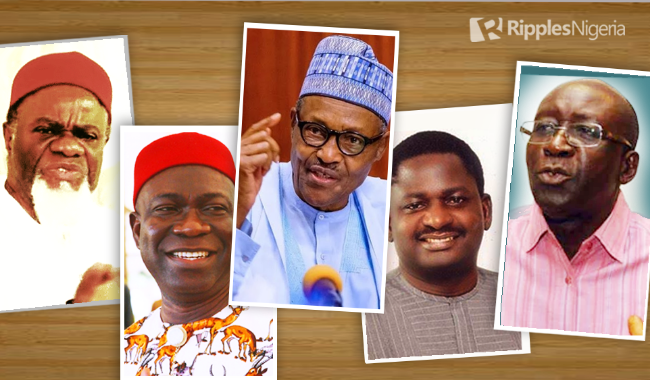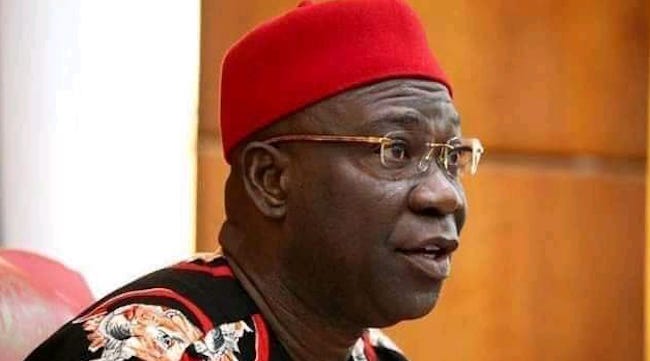Quick Read
QuickRead: Suspense over electoral bill. Four other stories we tracked and why they matter

During the week, Special Adviser to President Buhari, Femi Adesina, dropped a strong hint that his principal may not give his assent to the Electoral Amendment Bill, insisting that even without signing the Bill into law, Buhari’s reputation will remain intact.
The week in review also saw Nigerian lawmakers and top politicians going up in arms against the UK government over its decision to ban Nigerians from coming into their country following the detection of the Omicron variant of the coronavirus.
We tracked three other stories that made the headlines and got Nigerians talking. Enjoy this offering till we come your way next week.
1, Suspense over Electoral Amendment Bill
On December 6, Special Adviser on Media and Publicity to President Muhammdu Buhari, Femi Adesina, dropped a very strong hint that his principal, may, after all, not sign the Electoral Amendment Bill into law.
Adesina had said, while speaking on national television:
“Under President Buhari, the governing party has lost — states, legislative seats, and so many elections. So, his reputation as somebody who wants to leave clean elections for Nigeria has already been made whether the electoral act is signed or not. It doesn’t distract from that reputation.”
Why it matters
While most Nigerians are swayed by the position of the National Assembly on the Electoral Amendment Bill, with the belief that, if signed into law, it will sanitize the Nigerian political space, Adesina’s teaser may have betrayed the mood at the presidency regarding what Nigerians should expect.
The crux of Adesina’s statement should, therefore, be a source of worry for Nigerians who are desirous of having transparent and credible elections institutionalized in the country.
2, Lamenting travel ban
On December 7, the Senate roundly condemned the United Kingdom over a travel ban placed on Nigeria following the detection of the new Omicron variant of the coronavirus, urging the UK to urgently reverse its decision.
In a motion sponsored by Sen. Ike Ekweremadu titled “Need for Government of the United Kingdom to remove Nigeria from its COVID-19 Red List,” the lawmakers argued thus:
“Nigeria is among the countries with the lowest cases of COVID-19. The decision by the British Government to include Nigeria in its COVID-19 list, with its concomitant implications, will affect many citizens of Nigeria, who had planned to spend their Christmas and New Year holiday with their families.”
Why it matters
Ordinarily, the stance of Nigerian politicians and lawmakers on the UK placing Nigeria on the Covid-19 red list would have been a thing to be applauded.
However, the flip side of the coin, devoid of sentiments, is that the ban speaks to lack of confidence in Nigeria’s public healthcare management processes that leave gaping holes for abuses.
The temporary ban should, therefore, challenge the ruling elite to tighten the processes that allow citizens to procure positive COVID-19 results without submitting themselves to tests.
3. Bringing Sokoto killers to book
On December 8, President Muhammadu Buhari vowed to make sure that the bandits who murdered and burned innocent travellers in Sokoto will not go unpunished.
READ ALSO: QuickRead: Bandits rebranded terrorists. Four other stories we tracked and why they matter
In a statement issued by his media aide, Femi Adesina, Buhari was quoted to have said:
“I am very distressed at the manner of death visited on these hapless citizens who were undertaking a legitimate journey to another part of the country.
“I extend deep condolences to the families of the victims as I assure that the security agencies will continue to give their all to bring to an end the operations of these despicable people.”
Why it matters
The massacre in Sokoto continues to speak to rising insecurity in the country, the utter failure of government to address the issue and fears that Nigeria may slowly be grinding to a failed state.
Repeated assurances by President Buhari, without a clear roadmap on how to tackle the menace, only reinforces the strident calls for a review of the country’s security architecture that places ultimate control of security apparatus on the laps of just one man, without much concern for the subsisting federal structure.
4. PDP’s quit notice on APC
On December 10, the newly elected National Chairman of the Peoples Democratic Party (PDP), Senator Iyorchia Ayu, called on the ruling All Progressive Congress (APC) to start getting ready to quit power.
Ayu, while speaking in Abuja, during the inauguration of the newly elected national officers of the party, said among others:
“A PDP administration will change the narrative. We will unite the people. We will deepen the content of our democracy. We will rebuild our collapsed economy. We will make Nigerians the focus of development.
“To the APC, we, once again, renew our quit notice on you. Begin to prepare your handover notes.”
Why it matters
While the PDP’s statement may sound like sweet music to the ears of Nigerians, it must be appreciated within the context of regular rhetorics dished out by political parties intent on democratic overthrow of a ruling party.
Therefore, the character and form of the new leadership promised by the country’s dominant opposition party can only be measured, in the interim, by how it is able to deal with its internal issues and defense of democratic principles.
No doubt, Nigerians are eager for a change come 2023 but whether the PDP will be a better option is a matter of conjecture.
5. Ezeife’s condescending pleas
On December 5, former Governor of Anambra State, Chukwuemeka Ezeife, made what many have come to term a condescending plea.
While speaking at the United for Better Nigeria Initiative National Convention in Abuja, the elder statesman had said:
“The Igbo man does not kneel down but this time, we are prepared to kneel down to every part of Nigeria, every group, every ethnic group in Nigeria, we are prepared to even prostrate because we believe in this country.
“We are prepared to prostrate and beg for the president in 2023.”
Why it matters
The clamour for a President of Igbo extraction in 2023 has gone on for long, but the extent the Igbo man will go to achieve this has been accentuated by Ezeife’s comments.
Power, it is believed, is not gotten on sentiments or served a la carte. Therefore, Ezeife’s commentaries must be seen as an over dramatization of the quest for fair play, justice and equity within Nigeria’s political space.
As has been argued severally, a disregard for these unifying factors can only create more grounds for resentments and clamour for separation by aggrieved federating units.
Join the conversation
Support Ripples Nigeria, hold up solutions journalism
Balanced, fearless journalism driven by data comes at huge financial costs.
As a media platform, we hold leadership accountable and will not trade the right to press freedom and free speech for a piece of cake.
If you like what we do, and are ready to uphold solutions journalism, kindly donate to the Ripples Nigeria cause.
Your support would help to ensure that citizens and institutions continue to have free access to credible and reliable information for societal development.





























